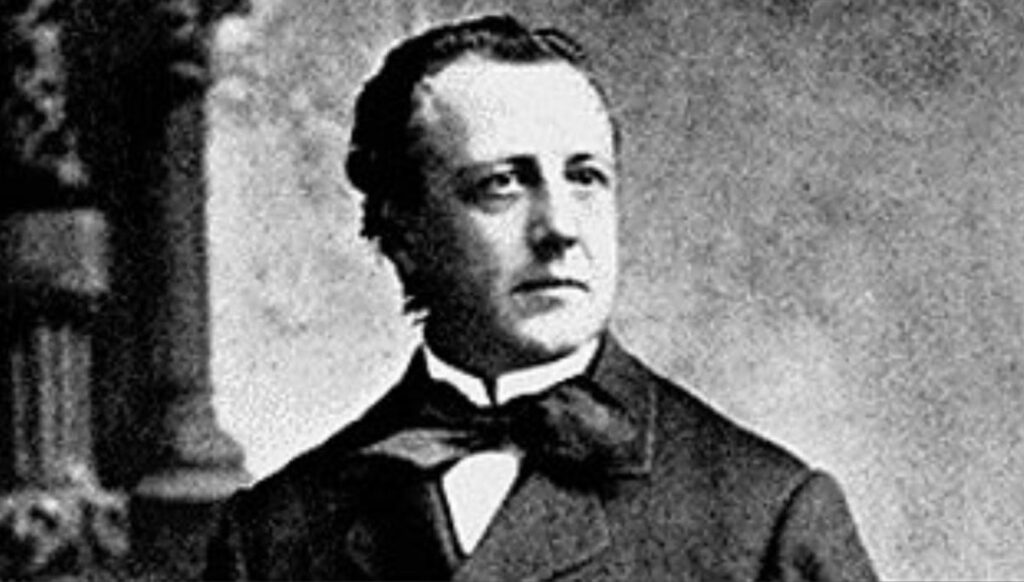Despite its simplicity, the hymn What a Friend We Have in Jesus ranks right up there with meatier, well-loved hymns of the faith. It gently reminds us that Jesus bears our sins, shares our sorrows, and is just a prayer away.
I had a particular fondness for this hymn as a child, but not for the reasons you might think. It was easy to play on the piano with just one flat and was my go-to hymn when I broke out the hymnbook. Not a very spiritual reason, I know, but in seriousness the words of the hymn are simple enough that even a child can understand and take comfort in them.
While the hymn might be familiar, the story of the man behind the hymn is less so.
The author of What a Friend We Have in Jesus was Joseph Medlicott Scriven, who was born in County Down, Northern Ireland, in 1819. He came from a well-respected family. His father was a Captain in the Royal Marines, who served in Canada during the War of 1812. Following in his father’s footsteps, Joseph planned for a life in the military. He attended military college to prepare for service in India, but he never realized this dream as he was forced to withdraw due to poor health. He then attended Trinity College, Dublin, where he graduated in 1842.
The following year, he was out riding with his fiancée the day before their wedding when tragedy struck. She fell off her horse while crossing a bridge, and before Scriven could get to her she drowned.
A few years later, Joseph moved to Canada and eventually settled down in Port Hope, Ontario. He worked as a tutor for Theodore Robert Pengelley. Once again, he found love when he met Pengelley’s niece, Eliza Roche. In 1859 they were engaged to be married but again tragedy struck when Eliza died of pneumonia. Scriven never did marry.
It’s hard to imagine that such a tender, gentle hymn came from a man with so much tragedy in his life. When I heard the life story of Joseph Scriven my human response was, Oh Lord, Why? Losing one fiancée is horrible, but two is unthinkable.
People’s reactions to trials vary greatly. A few weeks ago I shared the gospel with a man who wanted nothing to do with God. He told me some of the horrors he had endured as a child and explained that he could not believe in a God who would allow such things.
I sympathized with the man and grieved over the things he had to endure.
Both this man and Joseph Scriven had a choice. What will I do with my pain?
Many years ago I remember my father reciting this little poem to me.
Two men looked out from prison bars.
One saw mud and the other stars.
We each have a choice when faced with the difficulties of life. Trials can push us toward Jesus and cause us to cling to him, or they can turn us away from him.
The hymn we are all so familiar with was written as a poem for Scriven’s mother after he learned that she was ill. He entitled the poem Pray Without Ceasing. It was later renamed What a Friend We Have in Jesus.
~~~~~~~~~~~~~~~~~~~~~~~~~~~~~~~~~~~~~~~~~~~~~
What a friend we have in Jesus
All our sins and griefs to bear
What a privilege to carry
Everything to God in prayer
Oh, what peace we often forfeit
Oh, what needless pain we bear
All because we do not carry
Everything to God in prayer
Have we trials and temptations?
Is there trouble anywhere?
We should never be discouraged
Take it to the Lord in prayer
Can we find a friend so faithful
Who will all our sorrows share?
Jesus knows our every weakness
Take it to the Lord in prayer
~~~~~~~~~~~~~~~~~~~~~~~~~~~~~~~~~~~~~~~~~~~~~
Joseph Scriven spent his life as a tutor and a lay preacher. He became a familiar sight around Port Hope—a big man with bushy white hair and a full white beard.
It was his custom to preach on the street corners of Port Hope and the surrounding towns, but his presence wasn’t always appreciated. He endured peltings with fruits and vegetables. He was even arrested, yet nothing deterred him.
He gave away most of his money and possessions and worked to help the poor.
Someone who knew him said, “I never knew another person who was as constant a Christian.”
A lady in Toronto, who knew Joseph Scriven when she was a small child, recounted an incident when he was given money to pay his way from Port Hope to Toronto to attend a “religious gathering.” Before embarking on his journey he became aware of a need and gave the money away. With no money for transportation Scriven walked from Port Hope to Toronto, a distance of 62 miles (100 km).
A.F. Willis, one of Scriven’s former students, said this about him. “He was a humble Christian man, his one desire to spread the Gospel of our Lord Jesus Christ, and few then living in Port Hope and its vicinity did not have the question of their soul’s salvation put to them by him.”
The last person to see Joseph before his death was his friend James Sackville who took him into his home on a Saturday after hearing that Scriven was ill. According to Sackville, “His body was just worn down with toil, and his mind was wearied with failure and disappointment in his work during past years … His greatest fear appeared to be lest he should do anything to dishonor God, or bring reproach on the name of Christ.”
He desired to be home with the Lord he loved and had served throughout his life. During the last hour Sackville was with him, he heard him repeat two Scriptures: “I am the Lord’s” and “I will never leave thee nor forsake thee.”
Early the following day, Sackville went to check on his friend, but Joseph was not in the room. They searched for him for many hours until finally his lifeless body was found in some nearby water. Joseph Scriven was 66. The Port Hope Times wrote of his death saying that he was, “well known in Port Hope and in fact all over the riding, for his steadfast Christian life and as a street preacher of no mean ability.” The article stated that the reports of Scriven’s death were contradictory but set forth the following as the most probable. On Saturday night Scriven “retired telling his friends that he would no doubt be better in the morning, and that he intended rising about three o’clock and walking to Port Hope to preach on Sunday morning … It is thought that in a sudden fit of despondency he walked into the water and knelt down.” He was found in a kneeling posture.
Only God knows what really happened in those last moments of Joseph Scriven’s life, but true to the final words spoken from his mouth, he was the Lord’s and the Lord never left him nor forsook him. Through trials, tragedy, and persecution for the sake of the gospel, Scriven clung to his friend Jesus.
What a friend we have in Jesus. He bears our sins, shares our sorrows, and is just a prayer away.
Quotes and information for this blog came from the following sources:
Joseph Medlicott Scriven, What A Friend We Have in Jesus, 1855.
http://porthopehistory.com/jmscriven/
The Guide, October 11, 1918.
A.F. Willis, The Days of My Pilgrimage, (Hong Kong: The Christian Book Room, 1967).
The Port Hope Times, October 14, 1886.



That was very inspiring. He truly lived a life for Christ.
Thanks for it. I was really blessed.
God bless you richly.
Love Maureen
Thank you, Maureen. It really is inspiring. I also was blessed as I read of his life.
Very moving!
Whereas I knew about Scriven’s losses, I don’t think I knew about his death. I look forward to meeting him in heaven.
It is moving. Scriven is a fine example of a person who knew his God and acted on what he knew to be true. Thanks, Faith.
I love hearing “the stories behind” the great hymns of the faith! Thank you for sharing Joseph Scriven’s with us!
Loretta <
You’re welcome, Loretta. Knowing the experiences of the author of a hymn gives it an extra layer of depth. I, too, love hearing these stories.